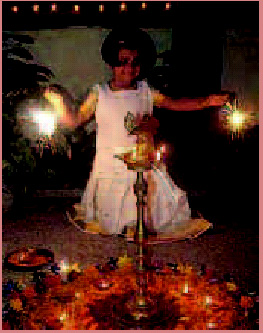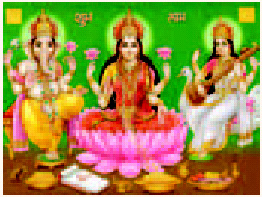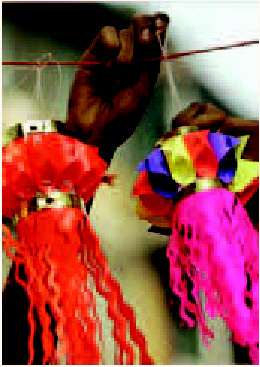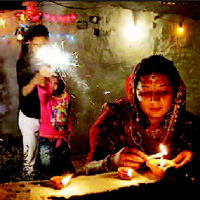Diwali: The Victory Of Good Over Evil
 Come the month of October, there is an air of festivity all around. It is the auspicious festival of Diwali that makes even the grimmest face smile in anticipation.It is indeed the time for all to usher into the light, it is the time to overcome all that evil, and it is the time to celebrate the supreme festival of the Hindus all over the world! Held on the fourteenth day of the waning phase of the moon in the month of Kartik (October – November), the night of Diwali is the darkest night of the darkest period of the year, and yet it is the celebration of light. Mythically, it is believed that Diwali marks the homecoming of the illustrious King Rama, who returned after defeating the evil Ravana in a battle that lasted for 14 years.
Come the month of October, there is an air of festivity all around. It is the auspicious festival of Diwali that makes even the grimmest face smile in anticipation.It is indeed the time for all to usher into the light, it is the time to overcome all that evil, and it is the time to celebrate the supreme festival of the Hindus all over the world! Held on the fourteenth day of the waning phase of the moon in the month of Kartik (October – November), the night of Diwali is the darkest night of the darkest period of the year, and yet it is the celebration of light. Mythically, it is believed that Diwali marks the homecoming of the illustrious King Rama, who returned after defeating the evil Ravana in a battle that lasted for 14 years.
Asato Maa Sat Gamaya (Lead me from falsehood to truth)
Tamaso Maa Jyotir Gamaya (Lead me from darkness to light)
The cities and far-flung boundaries of Ayodha, where Ram lived were lit up with rows of lamps glittering on dark nights to welcome home the divine king. However, at a metaphysical level, Diwali is a festival signifying the victory of good over evil where evil is destroyed and reduced to ashes by fireworks is the belief of the people. It symbolizes the aspiration of all Hindus to vanquish the ignorance that subdues humanity and to drive away the darkness that engulfs the light of knowledge. Diwali personifies moving from darkness to light. It is a holy tradition, which symbolizes the victory of good over bad!
It is the message of Upanishads, sages, and all enlightened Beings. Just like Buddha said: Appo Deepo Bhav. Be a light unto yourself. Epitomizing the triumph of good over evil, of righteousness over treachery, of truth over falsehood, and of light over darkness, Diwali is just not a festival; it is an integral part of our being, of our lifecycle and of our very existence in this beautiful world.
Celebrated joyously all over the country and also abroad by expatriates, it is also the festival of wealth and prosperity. Diwali is a festival where people from all age groups participate. They give expression to their happiness by lighting earthen ‘diyas’ (lamps), decorating houses, bursting firecrackers, and inviting near and dear ones to their households to partake in a sumptuous feast. The lighting of lamps is a way of paying respect to God for the attainment of health, wealth, knowledge, peace, valor, and fame.
 Now, when we look into the present day scenario, we find a significant change in the perception of Diwali, especially among younger generations. For the socalled generations X and Y, the occasion is to indulge in material pleasures and ‘enjoy’ the time. And no doubt, this is a gross fault of their parents in this matter – as they also fail to inculcate the true meaning and significance of Diwali to their wards. As such, the festival has become more an event to burn firecrackers, buy gifts, indulge in food and drinks rather then realize and practice the inner essence of the festival.
Now, when we look into the present day scenario, we find a significant change in the perception of Diwali, especially among younger generations. For the socalled generations X and Y, the occasion is to indulge in material pleasures and ‘enjoy’ the time. And no doubt, this is a gross fault of their parents in this matter – as they also fail to inculcate the true meaning and significance of Diwali to their wards. As such, the festival has become more an event to burn firecrackers, buy gifts, indulge in food and drinks rather then realize and practice the inner essence of the festival.
At the same time, with changing times, the methods of celebrating Diwali too has witnessed new twists and turns. The contemporary era has commercialized the entire event of Diwali.It is not that commercialization has affected the spirit of cheerfulness in any sense. Rather, it has helped Diwali get a global recognition. Earlier, any event was ritualized in a modest manner. But, as India joined the global bandwagon and got exposed with new cultures and traditions, the methods of celebrations too got extended.
Festivals are a big reason for the economy boost in India. The same goes for the festival of Diwali. Long before the eve of Diwali, people buy new clothes, Puja Samagri (items required for offering Prayers), home decorative items, firecrackers, etc. Companies of all kind offer heavy discount on their products during the festive season.
The days around Diwali, especially on Dhanteras, are supposed to be the most auspicious ones to buy household items and even jewelry. Diwali also attracts lots of foreign tourists to India as the festival of Diwali adorns the beauty of the country all the more. Market places are beautified with colorful ribbons, scintillating lights, and decorated stalls selling firecrackers, Diwali sweets, etc. add to the carnival. Many people do charity and feed a number of socially and economically deprived people.
Amongst all, do not forget the exchange of gifts that occur during the Diwali days. Very enthusiastically, people distribute gifts during Diwali. Buying and selling of gifts is a big source of profit during the season. Thus, very rightly Diwali is said to be a day of prosperity. For businessmen, this is the end of the financial year too. They make new business documents and before using them they are put before the Goddess Lakshmi for an auspicious start.
However, amidst the frenzy involving Diwali, it should not be put into oblivion that it is not only a festival of celebrations such as lightings, firecrackers, cleanliness, colorful rangoli making, social gatherings to exchange greetings and sharing sweets with your loved ones, but it is also a festival that is filled with spiritualism and religious activities such as worship of Goddess Lakshmi, worship of Lord Ganesha, worship of Mother Kali, worship of Lord Chitragupta, and worship of Govardhan Parvat.
It is important to understand the significance of the festival and believe in the same. For example, we all know that lighting lamps is a mandatory custom on the Diwali. Now, what is the significance of lighting a lamp? These lamps are meant as symbols, as a means to an end. But, what is this end? What is the real darkness, which must be dispelled? It is the darkness within us, the darkness of ignorance, selfishness, and duality that has to be eliminated. Indian culture says that we are all one. Indian culture says that as our brothers and sisters suffer in darkness, so we too are suffering, although we may not be aware of it. It is, therefore, our divine duty to help dispel the darkness in their lives and to help alleviate their suffering.
The lighting of the lamp has another significance too. It is through the light that the beauty of this world is revealed or experienced. Most civilizations of the world recognize the importance of light as a gift of God. It has always been a symbol of whatever is positive in our world of experience. To Hindus, darkness represents ignorance, and light is a metaphor for knowledge. Therefore, lighting a lamp symbolizes the destruction, through knowledge, of all negative forces – wickedness, violence, lust, anger, envy, greed, bigotry, fear, injustice, oppression and suffering, etc.
It is thus ironic that though Diwali is popularly known as the “festival of lights,” the most signif icant spiritual meaning is “the awareness of the inner light.” Central to Hindu philosophy is the assertion that there is something beyond the physical body and mind which is pure, infinite, and eternal, called the Atman (Spirit). Just as we celebrate the birth of our physical being, Diwali is the celebration of this Inner Light, in particular the knowing of which outshines all darkness, awakening the individual to one’s true nature, not as the body, but as the unchanging, infinite, immanent and transcendent reality. With the realization of the Atman comes universal compassion, love, and the awareness of the oneness of all things (higher knowledge). This brings Ananda (Inner Joy or Peace).
icant spiritual meaning is “the awareness of the inner light.” Central to Hindu philosophy is the assertion that there is something beyond the physical body and mind which is pure, infinite, and eternal, called the Atman (Spirit). Just as we celebrate the birth of our physical being, Diwali is the celebration of this Inner Light, in particular the knowing of which outshines all darkness, awakening the individual to one’s true nature, not as the body, but as the unchanging, infinite, immanent and transcendent reality. With the realization of the Atman comes universal compassion, love, and the awareness of the oneness of all things (higher knowledge). This brings Ananda (Inner Joy or Peace).
Diwali celebrates this through festival fireworks, lights, flowers, sharing of sweets, and worship. While the story behind Deepavali varies from region to region, the essence is the same – to rejoice in the Inner Light (Atman) or the underlying reality of all things (Brahman).
It can be said that through the passage there might be a paradigm shift in the interpretation of the festival of Diwali, and today, we find commercialization and limitless enthusiasm engulf the occasion. What remains the same throughout is that this day is a celebration of life, joy, and goodness. From darkness we enter into light, and light empowers us to do good deeds and bring us closer to divinity. Let us try to believe in this perception and share this with all concerned – work towards a better life and a better society, where the domi-nance of good over evil would be permanent and irrevocable.




























